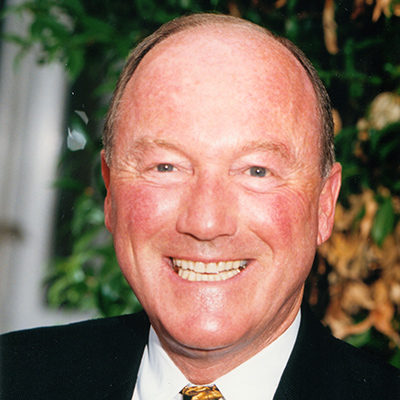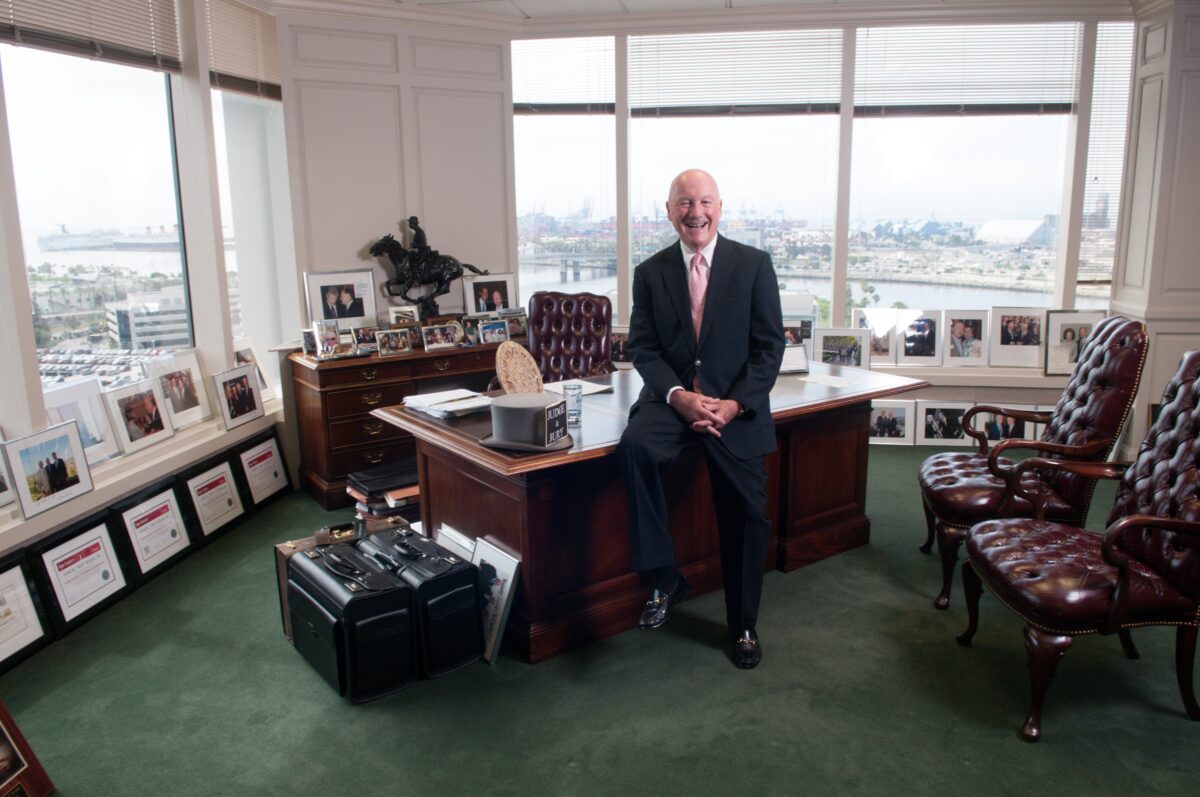Samuel “Skip” Keesal Jr., a securities and maritime lawyer who, after founding what became the city’s foremost law firm, became a pillar of the Long Beach establishment with a charm to court presidents, investment tycoons and chancellors alike — and who later dedicated his talents to philanthropy and equestrian sports — died on Tuesday at his home in Rolling Hills. He was 86.
His family said the cause of death was cancer.
It was Keesal’s father who gave him the nickname “Skip” because when he was away from home, Keesal was the “skipper of the ship.”
At the time of his death, Keesal skippered his own firm, Keesal, Young & Logan, which he founded in 1970 — he told this story many times — “with a secretary, two chairs and a used, $60 typewriter.”
The start came after six months’ active duty in the Army, driving and firing tanks, and another six years as a reservist, rising to the rank of platoon sergeant. After a year at the University of Arizona, Keesal transferred to Cal State Long Beach, where he earned a bachelor’s in business in 1962. In 1965, he got his law degree from the University of Southern California.
By the 1990s, he had established one of the biggest and most admired law firms in California.
After working out of an office at Catalina Landing Building at 310 Golden Shore — where they are located today — the firm bought the Union Bank building in downtown Long Beach for $5.6 million in 1993. They moved into that building in 1995 and stayed there through 2024, when they sold it.
From there, the firm expanded at breakneck speed, employing 150 people in the top six floors of the 14-story, 158,000-square-foot ocean-view office space. At its peak, it had 96 lawyers working out of five locations in Long Beach, San Francisco, Seattle, Anchorage and even in Hong Kong in 1997.
Among their clients at the time, 50 to 75 were Fortune 500 companies, including accounts with Unocal, Merrill Lynch, Prudential, General Electric, Toyota, Arco, Charles Schwab and Western Union. A swath of the firm’s cases then involved securities law, as well as maritime law, professional malpractice defense and real estate matters.
From a vast office on the 14th floor, which affords a picturesque view of the Long Beach Harbor, Keesal defended investment firms on Wall Street, shipping companies in London and international corporations. In his 60 years of practicing law, the man tried more than 250 cases in 16 different states, winning multimillion-dollar jury verdicts in his clients’ favor.
“He was a real, true litigator,” said Steve Young, a partner who first joined the firm as a law clerk in 1972. “He loved being in court, or arbitration or whatever the forum was.”

People like Keesal were called in as the big guns, when in-house counsel was out of their depth. His defense swayed major, multi-million dollar disaster decisions, such as the Exxon Valdez oil spill over Alaska’s Prince William Sound in 1989 and again in 2007, after the Cosco Busan cargo barge struck a Bay Bridge support pier and spilled 58,000 gallons into the San Francisco Bay.
He was also one of the attorneys who represented former President Bill Clinton and First Lady Hillary Clinton in the Whitewater controversy in the 1990s, and remained close to the former president after that.
In 1990, Keesal was inducted into the International Academy of Trial Lawyers — a prestigious group totaling only 500 members in the world, and in 2024, was awarded a Key to the City from Mayor Rex Richardson.
Far from the unsavory lawyers of John Grisham novels, Keesal attributed the phenomenal success of his firm to hard work and straightforward, honest lawyering.
He had a charisma about him, able to invoke calm confidence into a room despite whatever disaster may loom overhead. Unlike other corporate lawyers, Keesal always preferred to plead his case before a jury, rather than a judge.
“That was kind of the secret of his success,” Young said. “Jurors liked them and judges liked them, and arbitrators liked him, and it made him very, very successful.”
Soft-spoken, erudite and gentlemanly, Keesal had a knack for being calm under pressure, listening before talking and always saw the nuance in justice, often taking the lawyerly path to resolution.
“Whether someone was, you know, a security guard in a building, or a captain of business on Wall Street, or a governor or waitress, he always gave everybody his full attention, and he always made him feel like he cared,” Skip’s son Steve Keesal said.
At the time of his death, Keesal had never actually retired.
“He was a real believer in ‘drag me out of here when I’m dead,’” Steve Keesal said. His later days, though, were dedicated more to philanthropy than lawyering.
“It is hard to imagine an individual with more professional success, who has given back to the community where that success was earned, then attorney Skip Keesal,” said Long Beach City Prosecutor Doug Haubert. “He will be remembered as a legend in the legal field, but he has done more for the people of Long Beach than anyone will ever know.”
Keesal’s facility on top of the Union Bank Building was famous for hosting everything from small receptions to luncheons and dinners featuring world leaders, presidents and entertainers, always for charitable causes.
In the dining room that seated more than 300 people, Keesal famously held the Long Beach Boys & Girls Club fund-raising luncheon at the 14th-floor dining facilities.
There, guests — most of whom paid $1,000 a ticket — regularly attended a function that has in the past attracted such dignitaries as Margaret Thatcher, George W. Bush, Henry Kissinger, Bill Clinton, Gerald Ford, Robert Kennedy Jr. and Diane Feinstein, among many others.
Republicans and Democrats alike sought his counsel, and he was never one to think that agreement on politics was a precondition for friendship.
Using his political sway and through the Keesal, Young & Logan Charitable Foundation, Keesal brought around $7 million in donations to organizations like the Boys & Girls Club, the YMCA, Long Beach Cancer League, Steel Magnolias, CSULB Performing Arts Center, Legal Aid, Boy Scouts of America and the Children’s Health Fund of New York.
“I will miss our lunches, his advice, and mostly his stories and friendship,” said Congressman Robert Garcia in a statement Wednesday. “My thoughts are with Beth, his family, and all those who loved him.”
Keesal and his wife, Beth, served on numerous boards of charitable organizations for many years.
Keesal’s life wasn’t always about work. He also threw one of the most famously coveted parties each year for the Long Beach Grand Prix, which used to attract 1,000 people at a time to his Oceangate enclave to observe the race.
He would boast that he saw several of Muhammad Ali’s fights in person, as well as a handful of Super Bowls and the annual Indianapolis 500. For a 17-year stretch, the USC Law School graduate once said he didn’t miss a single Trojan football game.
He spent many summers in Lake Como in Italy and along the beaches in the South of France.
He was a decent volleyball player and an accomplished skier, but if Skip Keesal were still alive, he’d tell you his favorite sporting enthusiasm is roping.
The son of a retired salesman and a Broadway actress, Keesal was moved in infancy from Chicago to a 109-acre ranch in Tucson, Ariz., with his two brothers and two sisters. There he learned to ride horses bareback — then bulls — and, using his own roping pen some distance from the homestead, Keesal honed the art of roping on his family’s one steer and one calf.
He went on to compete in local rodeos as a high school teenager, a passion he continued into adulthood despite his busy schedule.
Those who knew him described Keesal as the urbane cowboy, the kind of weekend ranch hand that could — and would — rope a steer in a Brooks Brothers suit and Gucci loafers.
In his later years, Keesal purchased a horse from the “Gunsmoke” actor James Arness and joined the Empty Saddle Club, a renowned Western barn near his home in Rolling Hills.
News of his passing on Wednesday came as a shock to the many workers the firm retains today, Young said. On his way back from arbitration in downtown Los Angeles, Young stopped by Keesal’s home to pay a visit.
“I stopped by to say, you know, hello and to check on him, and Beth was holding his hand and in tears,” Young said. Keesal was close to death. “It was past that point of a conversation,” Young said, “but I did have a chance to tell him how much I appreciated being his partner for 50 years.”
Keesal is survived by his wife, Beth; three children, Katherine, Carolyn, Steven and Hope; and one grandson, Jackson.

